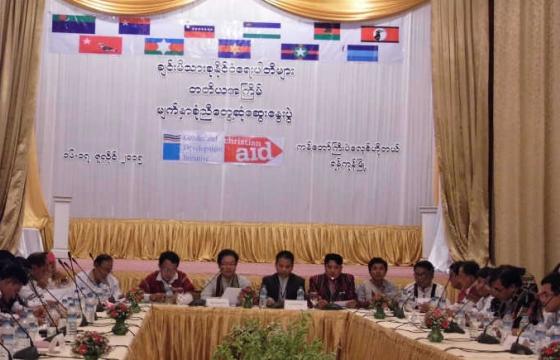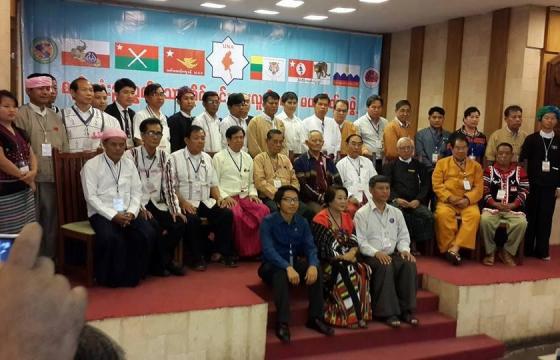Salai Kyaw Moe Tun — “This is the democracy to demand public’s right. Our education and living standards will improve and we would become developed like Singapore, Thailand, and China within 30 to 40 years if we can develop our industrial country. So, I want to request the public to join hands with us in order to carry this out,” Chin State Parliament’s Deputy Speaker U Ohn Lwin said in an interview with BNI Election Newsroom.
Q: Please tell us how you came to serve as Deputy Speaker of the Chin State Parliament.
A: Before serving in the parliament, I ran for the Chin State Parliament from Constituency No 1 and won. So, I received the deputy speaker position in the parliament when it was formed on January 30, 2011. I have been serving as Deputy Speaker of the Chin State Parliament ever since.
Q: In which departments have you served before becoming the deputy speaker of the parliament?
A: I started my career serving in the Township Records Office. Since 1978, I have worked as a civil servant at the Township Records Office in Matupi. In 1993 I was transferred to the Mindat District Records Office. I was then transferred back to Matupi Township in 1997, and after receiving a promotion in 2003 I served as the supervisor.
Q: You have been serving as the Parliament’s Deputy Speaker for five years. What kind of responsibilities have you taken as the Deputy Speaker and what kind of laws have you enacted?
A: Well, I have not quite been serving for five years yet since the Parliament was formed on January 31, 2011, so the five year anniversary will be in three months. In the parliament, I held regular sessions, special sessions, and emergency sessions.
We have enacted laws that contributed to the public of Chin State in the parliament. We have held 18 sessions - 11 regular sessions, 3 special sessions, and 4 emergency sessions. We have enacted over 20 laws in the Chin State Parliament and 16 bylaws as the government.
The Lower House MPs have gone on field trips to their respective constituencies during their free time. They go on field trips to study and question the desires and needs of the public. Questions were raised in the Parliament for the public’s needs and we worked for public’s benefit in the Parliament during these five years.
Q: How will the recent flooding affect the election in Chin State?
A: Regarding the recent natural disaster, I don’t think it will have a big impact on the election. It may hinder the election a little. The public was interested in the 2015 Election at first, but they have to struggle for their livelihoods and to rebuild their homes so they may now lack interest in the election.
Q: Has the flooding hindered election campaigning?
A: There have been some hindrances because when we go to the rural areas, some villages can be reached by car while some can only be reached by motorcycle. Motor roads have been damaged due to the natural disasters. Bridges have also been damaged. So, we were unable to make good progress in travelling. Sometimes, we had to travel by motorcycle or by foot. There are times we were too late in meeting with the public.
Our Chin State has many farmers. They have to harvest the rice during the time for hillside cultivation. When we couldn’t arrive on time, we had to sleep in the hillside. It’s only convenient for us if we can keep more in touch with the public. But sometimes we could only meet with half of them. So, there have been some hindrances.
Q: What kind of challenges do you think will arise during the 2015 election, compared to the 2010 election?
A: There were fewer parties running in Chin State back in 2010. I have learned that there will be 13 Chin State-based parties running in this election. As the USDP and the NLD have to run against these 13 parties, we have to make more efforts than before.
In the past, there were fewer parties so they only focused on the USDP, which is a big party, when going to the rural areas. Now, the NLD has been included. The number of Chin national parties has also increased so we have to run against them.
Q: When running against other parties, how do you rally the people to vote for the USDP rather than other parties?
A: I represented the USDP back in 2010 and won. This government has been leading for multiparty democracy within its five-year term. The things we have carried out for public’s benefit have been successful to an extent. When we communicate with the international [community], we have received much recognition.
We have to tell this to the public during the 2015 Election campaign to make them understand. Motor roads and motorcycle paths have been built in the far-flung parts. Also, many of the motor roads in the Chin State are big roads.
We also have the Union Highway as well as the ones taken responsibility by the government. We have built 30 feet highways that are unexpected by the public. The public has become quite interested for the parts that are built by the company. Later on, the public have trust in our government.
Q: What’s your view on the government’s transfer of road construction [projects] to [private] companies?
A: This part is carried out after signing contracts with the companies. There are regulations regarding the standards of road construction. The private companies have to rebuild the roads until they are accepted by the government. Respective ministries have to inspect the roads built in each township. The roads in Chin State are built on soft earth so sometimes they are washed away by landslides. Some of the situations are out of reach of the government. But, the companies need to continue to build the roads as they have signed contracts to take responsibility for them. So, there’s no need to worry. The public doesn’t suffer. We are making our best efforts.
Q: What do you want to say to the public? What do you want to tell them to vote for your party in the election?
A: I want all eligible voters to vote in peace in the upcoming election because we are from a civilian government.
No matter which government takes office, they have to work for the public. So, we want the public to vote within the limitation of the law in order not to lose the democracy path. No matter how the parties rally to the public, the public needs to decide whether to accept them or not. This is the democracy to demand public’s right. Our education and living standards will improve and we would become developed like Singapore, Thailand, and China within 30 to 40 years if we can develop our industrial country. So, I want to request the public to join hands with us in order to carry this out.






